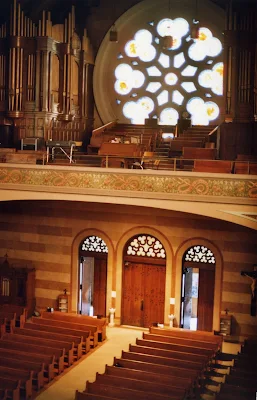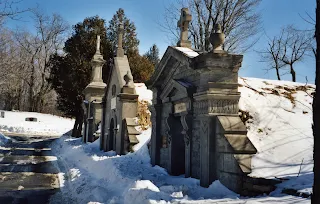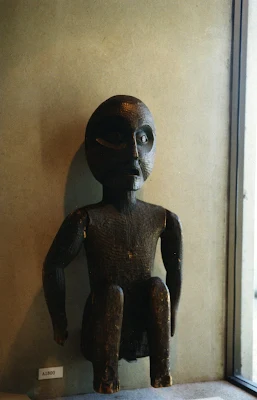
Saturday, March 7, 2009
Thursday, March 5, 2009
The Motel Raphael

I drove passed the Motel Raphael for years. The Motel Raphael, located just off the St. Jacques exit on highway 20... When I was a child, sitting beside my mother in our 1961 Pontiac as we returned from my future step-father's apartment in the West Island, we drove by the Motel Raphael. I remember on those occasions sitting beside Mother, singing "Me and My Shadow" in the darkness, on our way home to Oxford Avenue in N.D.G. When I lived in Huntingdon we'd pass the Motel Raphael on the way to the Mercier Bridge and arrive home an hour later; I'm glad those days of commuting are over. Later Artie Gold lived at the Motel Raphael, no money, screwed out of the trust money his father had left for him, the social services agency placed him at the motel; eventually the trust was discovered and Artie moved to the Westmore Apartments on Sherbrooke Street West, where he lived until February 2007. I've heard of others, hard on their luck, living at the Motel Raphael. Now it has a new name, bought by a chain, perhaps it's King's Inn... but stay happy, you need never be homeless, there is always the Motel Raphael (it will always be the Motel Raphael to some of us) where you can live. Yes, I've thought of living there myself. I even priced a room a few years ago. It's a short walk up the hill to a 24 hour MacDonald's, to Picasso's Restaurant if they ever reopen, Super C for inexpensive groceries, and then turn left on Cavendish, walk through the underpass, and a block later you're at the corner of Sherbrooke and a number 105 bus waiting to take you downtown, back to civilization in about twenty minutes. Hurrah for the Motel Raphael! We need never be homeless!
Sunday, March 1, 2009
March 1st, 2009
My great grandmother, Mary Callaghan, was also born on this day, on March 1st,1845; she died in 1906, on April 27, my birthday. Mary Callaghan’s father also died on April 27, but in 1905. We are bound to our ancestors in many ways; one way is by synchronistic dates, by meaningful coincidence, by cosmic coincidence. Some dates seem fated and deprived, others are blessed and joyous; some dates have astrological importance and others, still, are historical. Some dates, births and deaths, repeat themselves over many generations of family members—to me, this coincidence of dates has always suggested a greater design to existence.
We are a lineage of generations, a line of people who played, variously, leading roles, or bit parts, in each others’ lives. We exchange roles with each other in our many incarnations—in this life you be the mother and I’ll be your son; you be the daughter and I’ll be your father; you be the grandson and I’ll be your grandmother. Our lives are an enactment of archetypal relationships, each demanding a compassionate awareness of life’s transience and finitude, if we are ever to be free of the turning wheel of endings and beginnings.
The lives we have lived, previous lives, like lives to come in the future, seem inestimable, and inexhaustible; indeed, they are a metaphor for the life we are presently living. This present incarnation, this latest dramatic depiction of existence, seems in itself like a series of incarnations, as we move from childhood to middle life to old age. In this life we experience archetypal roles and relationships—they give a grandeur to existence—in them we find a depth and meaningfulness to life’s journey, the movement from birth to death to birth to death, again and again. I know that we must eventually die to each life, including the events of this life, to complete the cycle, to be done with existence.
In this existence of ours, Fate plays as much a part as free will. I was a soldier in World War One wearing a green khaki uniform, and going over the lip of a muddy trench, bayonet drawn, willing to kill or be killed, for the greater glory, for poetry and God and King, for family and death. That was in 1916, the year Mother was born in Montreal’s St. Henry neighbourhood. A few years ago, when I was driving her one Saturday morning along Notre Dame Street to Central Station downtown, on her way to Toronto to spend Christmas or Easter with my brother and his family, we passed Irene Street and Mother suddenly announced, “I was born on that street!” She always had a mind for remembering the past.
Saturday, February 28, 2009
Sunday, February 22, 2009
Saturday, February 21, 2009
Friday, February 20, 2009
Where The Molsons Are Buried


 The doors to the Molson mausoleum, decorated with bare breasted angels, have now been removed as they had severely deteriorated over the years. These angels are, truly, an affirmation of life in the midst of death, even though someone doesn't know that angels are male and not female; anyhow, p,laying along with the eroticism these particular female angels are more abundantly endowed than one would expect. Perhaps there is an interesting story behind their creation.
The doors to the Molson mausoleum, decorated with bare breasted angels, have now been removed as they had severely deteriorated over the years. These angels are, truly, an affirmation of life in the midst of death, even though someone doesn't know that angels are male and not female; anyhow, p,laying along with the eroticism these particular female angels are more abundantly endowed than one would expect. Perhaps there is an interesting story behind their creation.
Wednesday, February 18, 2009
Tuesday, February 17, 2009
Monday, February 16, 2009
Sunday, February 15, 2009
Saturday, February 14, 2009
Artie Gold, two years later














































